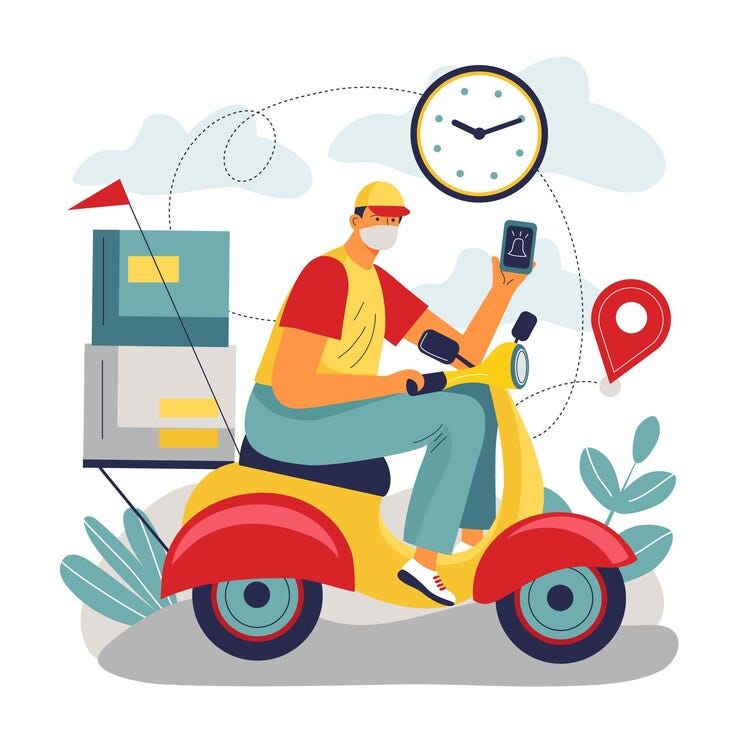The Environmental Impact of Catering Delivery: Finding Sustainable Solutions

In today’s fast-paced corporate world, corporate catering has become an essential part of office life. Whether it’s a power lunch, an important meeting, or a team-building event, the convenience of having delicious meals delivered directly to your workplace is unmatched. However, the ease of catering delivery services comes at a cost to the environment.
As businesses increasingly prioritize sustainability, it’s crucial to address the environmental impact of catering delivery and explore innovative solutions. In this article, we’ll delve into the sustainability challenges posed by corporate catering delivery and discuss practical ways to reduce its ecological footprint.
The Ecological Toll of Corporate Catering Delivery
Corporate catering delivery, while offering convenience and culinary delight, often has a more significant environmental impact than meets the eye.
Food Miles and Emissions: The vast distances that ingredients and prepared meals travel contribute to carbon emissions. Delivery vehicles, especially those powered by fossil fuels, are primary culprits.
Single-Use Plastics: Many catering deliveries involve single-use plastic containers, utensils, and packaging. These plastics contribute to pollution and harm marine life.
Food Waste: Overordering and food waste from corporate events increase the load on landfills. Reducing food waste is a sustainability challenge that needs to be addressed.
Sustainable Practices in Corporate Catering Delivery
Amid the concerns surrounding the environmental impact of corporate catering delivery, businesses and caterers are taking steps to minimize their ecological footprint.
Local Sourcing: Opt for caterers who source their ingredients locally to reduce food miles. Emphasize seasonal and sustainable options on your catering menu.
Eco-Friendly Packaging: Choose caterers who offer eco-friendly packaging alternatives. Encourage reusable utensils and dishware.
Waste Reduction Strategies: Employ effective food waste reduction strategies, such as portion control. Donate surplus food to local charities instead of discarding it.
Alternative Transportation: Caterers can adopt more sustainable delivery services practice. Electric or hybrid delivery vehicles can help reduce emissions.
Amid the concerns surrounding the environmental impact of corporate catering delivery, businesses and caterers are taking significant steps to minimize their ecological footprint. In addition to the measures mentioned earlier, another key initiative is focusing on food waste reduction within the corporate catering industry.
By implementing strategies like improved portion control and innovative food donation programs, caterers can significantly reduce the amount of food destined for landfills. Moreover, they can collaborate with clients to create customized meal plans that align with the number of attendees, further minimizing excess food. This not only contributes to sustainability but also reflects the conscientious efforts of businesses to combat food waste, a global challenge that demands our attention and innovative solutions.
The Role of Technology in Sustainable Catering Delivery
Advancements in technology are empowering the catering industry to enhance its sustainability efforts.
Online Ordering and Meal Planning: Online platforms and apps enable more precise meal planning. This reduces the chances of overordering and subsequent food waste.
Route Optimization: Logistics software like multi stop route planning can help catering delivery companies optimize routes. Efficient routes reduce fuel consumption and emissions.
Sustainability Reporting: Technology allows businesses to track and report their sustainability efforts. This can be used as a marketing tool to attract eco-conscious clients.
Advancements in technology are empowering the catering industry to enhance its sustainability efforts. From online platforms that streamline meal planning to innovative logistics software that optimizes delivery service routes, technology is proving to be a game-changer for the world of sustainable catering delivery.
But there’s more to the story. The integration of smart sensors and IoT (Internet of Things) devices in food storage and transportation ensures that temperature-sensitive items remain fresh and safe, reducing food spoilage. Additionally, real-time monitoring of delivery vehicles’ performance enables companies to fine-tune their operations for maximum efficiency and minimal environmental impact. These digital solutions not only boost sustainability but also enhance the overall experience of corporate catering by ensuring that every meal arrives at its destination in peak condition.
The Positive Impact of Sustainable Corporate Catering Delivery
The adoption of sustainable practices in office catering delivery can have a far-reaching positive impact.
Eco-Conscious Clientele: Businesses that prioritize sustainability are likely to attract eco-conscious clients. It can be a selling point for your corporate catering services.
Cost Savings: Reducing food waste and optimizing delivery routes can lead to cost savings. Sustainability can be financially beneficial in the long run.
Reduced Carbon Footprint: Implementing sustainable solutions directly contributes to the reduction of your carbon footprint. It’s a step toward a greener future.
Conclusion:
In a world where corporate catering delivery plays a significant role in office life, it’s vital to acknowledge and address the environmental impact. Embracing sustainability in corporate catering is not just an ethical choice; it’s a strategic one. By adopting practices that reduce food miles, minimize waste, and utilize technology to optimize deliveries, businesses can play a crucial role in finding sustainable solutions for on demand catering delivery services. These actions not only benefit the environment but also offer a competitive edge in a world where green initiatives are becoming increasingly important.

Comments
Post a Comment